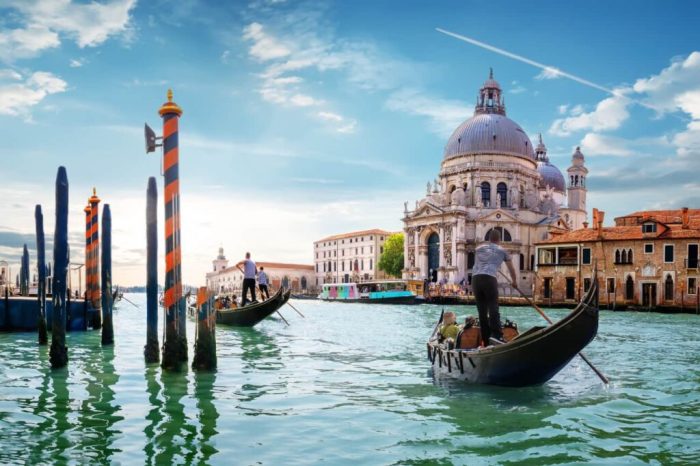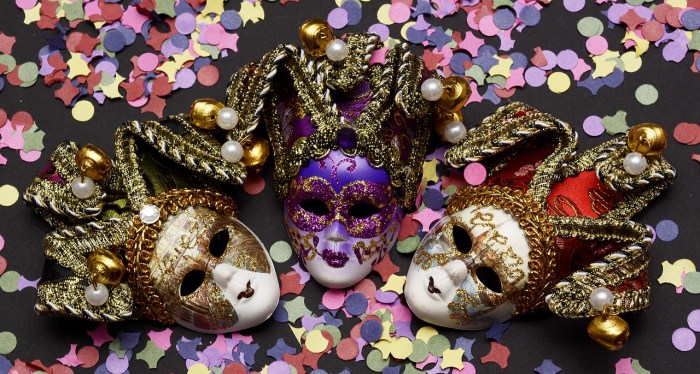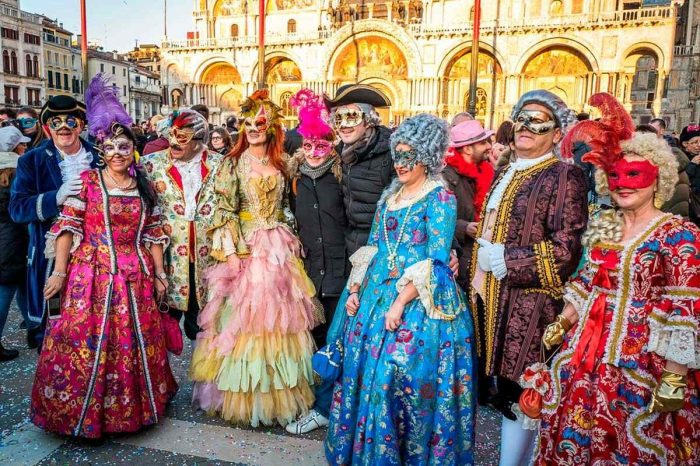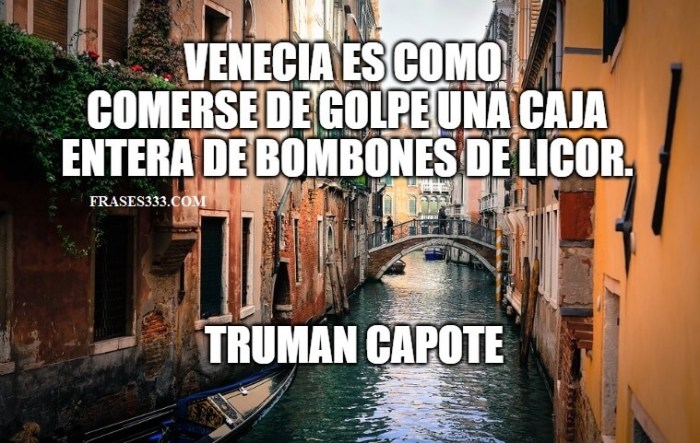Embark on a linguistic adventure through the enchanting canals of Venice with our comprehensive guide to “Frases de Venecia en Italiano.” Discover the essential phrases for navigating this captivating city, from exchanging greetings to savoring authentic cuisine.
Immerse yourself in the unique Venetian dialect, a treasure trove of distinct vocabulary, grammar, and pronunciation. Uncover the origins and meanings behind historical phrases and sayings that have shaped Venice’s rich heritage.
Italian Phrases Commonly Used in Venice

Navigating Venice can be a breeze with a few essential Italian phrases. From greetings to asking for directions, knowing some local lingo will enhance your experience.
Between the romantic canals of Venice and the intriguing question of what is splendid greens cava , the beauty of Italian phrases like “Ti amo” and “Ciao bella” lingers in the air. These enchanting words capture the essence of Venice, where love and elegance intertwine, just as the flavors of splendid greens cava tantalize the palate.
Greetings
When meeting someone, a friendly “Buongiorno” (Good morning) or “Buonasera” (Good evening) is always appreciated. To say hello informally, you can use “Ciao.”
Asking for Directions
Getting lost in Venice’s labyrinthine streets is part of the charm. But if you need help, here are some phrases:
- “Scusi, dove si trova…?” (Excuse me, where is…?)
- “Potrebbe indicarmi la strada per…?” (Could you show me the way to…?)
- “Quanto dista…?” (How far is it to…?)
Ordering Food
Indulge in Venice’s culinary delights by knowing these phrases:
- “Vorrei ordinare…” (I would like to order…)
- “Il conto, per favore” (The bill, please)
- “Mi potrebbe portare…” (Could you bring me…)
Unique Venetian Dialect

The Venetian dialect, known as “Veneziano,” is a distinct and charming variation of the Italian language spoken in Venice and its surrounding areas. It has its own unique vocabulary, grammar, and pronunciation, which set it apart from other Italian dialects.
Vocabulary
The Venetian dialect incorporates a mix of Italian and Venetian words. Some common Venetian words include:
- bacaro– small bar or tavern
- bragosso– flat-bottomed boat
- ombra– glass of wine
- sestiere– one of the six districts of Venice
- traghetto– gondola ferry
Grammar
Venetian grammar differs from standard Italian in several ways. For example:
- The definite article “il” becomes “el” or “lo” in Venetian.
- The verb “avere” (to have) becomes “aver” in Venetian.
- The past tense of regular verbs ends in “-emo” in Venetian, instead of “-ammo” in Italian.
Pronunciation
The Venetian dialect has a distinct pronunciation, characterized by:
- A strong emphasis on the first syllable of words.
- The use of the “s” sound instead of the “z” sound in many words.
- The rolling of the “r” sound.
Here are some common Venetian phrases and their Italian counterparts:
- Ciao– Hello (Venetian) / Buongiorno(Italian)
- Come sta?– How are you? (Venetian) / Come sta?(Italian)
- Grazie– Thank you (Venetian) / Grazie(Italian)
- Prego– You’re welcome (Venetian) / Prego(Italian)
- Bon apetito– Enjoy your meal (Venetian) / Buon appetito(Italian)
Historical Phrases and Sayings

Venice, a city with a rich and storied past, has given rise to a wealth of historical phrases and sayings that reflect its unique character and experiences.
These phrases and sayings often have their roots in the city’s maritime history, its role as a center of trade and diplomacy, and its complex political and social dynamics.
The Serenissima
One of the most famous phrases associated with Venice is “La Serenissima,” which means “The Most Serene Republic.” This phrase was used to refer to the Republic of Venice, which existed from the 7th to the 18th century.
The term “Serene” was meant to convey the republic’s independence, power, and prestige. It was also a way to distinguish Venice from other Italian city-states, which were often embroiled in conflict.
“Venezia, città di canali”
Another well-known phrase about Venice is “Venezia, città di canali,” which translates to “Venice, city of canals.” This phrase is a simple but evocative description of one of the city’s most iconic features.
The canals of Venice have been an integral part of the city’s life and culture for centuries. They were used for transportation, trade, and defense. The phrase “Venezia, città di canali” captures the essence of Venice’s unique relationship with water.
“Sotto i ponti di Rialto”
The Rialto Bridge is one of the most famous bridges in Venice. It was built in the 16th century and spans the Grand Canal.
The phrase “Sotto i ponti di Rialto” (Under the Rialto Bridge) is often used to describe a place where people can meet and socialize. It is also a place where people can buy souvenirs and enjoy the city’s atmosphere.
Romantic and Poetic Expressions

Venice, with its captivating canals, enchanting bridges, and alluring atmosphere, has inspired countless romantic expressions over the centuries. These phrases evoke the city’s unique charm, capturing the essence of love, longing, and the city’s enduring allure.
Love and Desire, Frases de venecia en italiano
“Sei la mia Venezia, il mio sogno d’amore”(You are my Venice, my dream of love)
Expresses the intense and overwhelming nature of love, comparing the beloved to the enchanting city itself.
“Il nostro amore è come una gondola, scivola dolcemente sui canali del tempo”(Our love is like a gondola, gliding softly through the canals of time)
Conveys the timeless and romantic nature of love, suggesting that it will endure through the passage of time.
“I tuoi occhi sono come le lagune, profondi e misteriosi”(Your eyes are like the lagoons, deep and mysterious)
Compares the beloved’s eyes to the enigmatic and alluring waters of Venice’s canals.
Cultural Phrases and Proverbs
Venetian culture is rich in proverbs and cultural phrases that reflect the city’s unique history, values, and traditions. These expressions provide insights into the Venetian way of life and offer a glimpse into the city’s soul.
One common Venetian proverb is “Venezia xe un libro sempre averto” (“Venice is a book always open”). This proverb captures the city’s vibrant and open atmosphere, where every corner offers a new story to discover.
Local Traditions
Venetian cultural phrases often revolve around the city’s maritime traditions and close relationship with the sea. For example, the phrase “andar per mar” (“to go by sea”) is not just a literal description of travel but also a metaphor for embarking on a new adventure or taking a risk.
Community Values
Proverbs in Venice also reflect the city’s strong sense of community and shared values. The phrase “xe mejo un amigo che cento parenti” (“it’s better to have one friend than a hundred relatives”) emphasizes the importance of close relationships and the value of true friendship.
Historical Significance
Some Venetian phrases have deep historical roots. For example, the phrase “xe sempre bon tempo per far ben” (“it’s always a good time to do good”) was first uttered by the Doge of Venice, Francesco Foscari, in the 15th century.
This proverb reminds Venetians to seize every opportunity to make a positive impact on the world.
Contemporary Venetian Phrases: Frases De Venecia En Italiano
Venetian culture is a blend of historical heritage and modern influences, and this is reflected in the language spoken by the locals. Contemporary Venetian phrases capture the city’s unique identity and its evolving lifestyle.
These phrases often incorporate local slang, pop culture references, and humor, showcasing the vibrant and dynamic nature of Venetian society.
Modern and Colloquial Phrases
- “Magnar da Dio”(To eat like a god): A phrase used to express extreme satisfaction with a meal.
- “Far un giro in gondola”(To take a gondola ride): A must-do experience for tourists and locals alike.
- “Ocio che xe bagnato”(Watch out, it’s wet): A warning about slippery conditions, especially during Venice’s frequent floods.
- “Xe ‘na figata”(It’s cool): A phrase used to express approval or admiration.
- “Ma sì, dai”(Yes, come on): A phrase used to encourage someone or to express agreement.
Question Bank
What are some essential Italian phrases for visiting Venice?
Greetings: “Buongiorno” (good morning), “Buona sera” (good evening), “Grazie” (thank you)
Asking for directions: “Scusi, dov’è…?” (Excuse me, where is…?), “A destra/sinistra” (right/left)
Ordering food: “Vorrei…” (I would like…), “Il conto, per favore” (The bill, please)